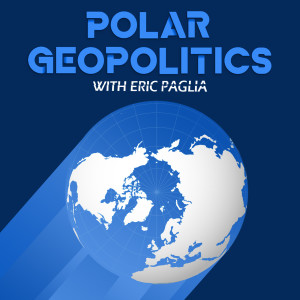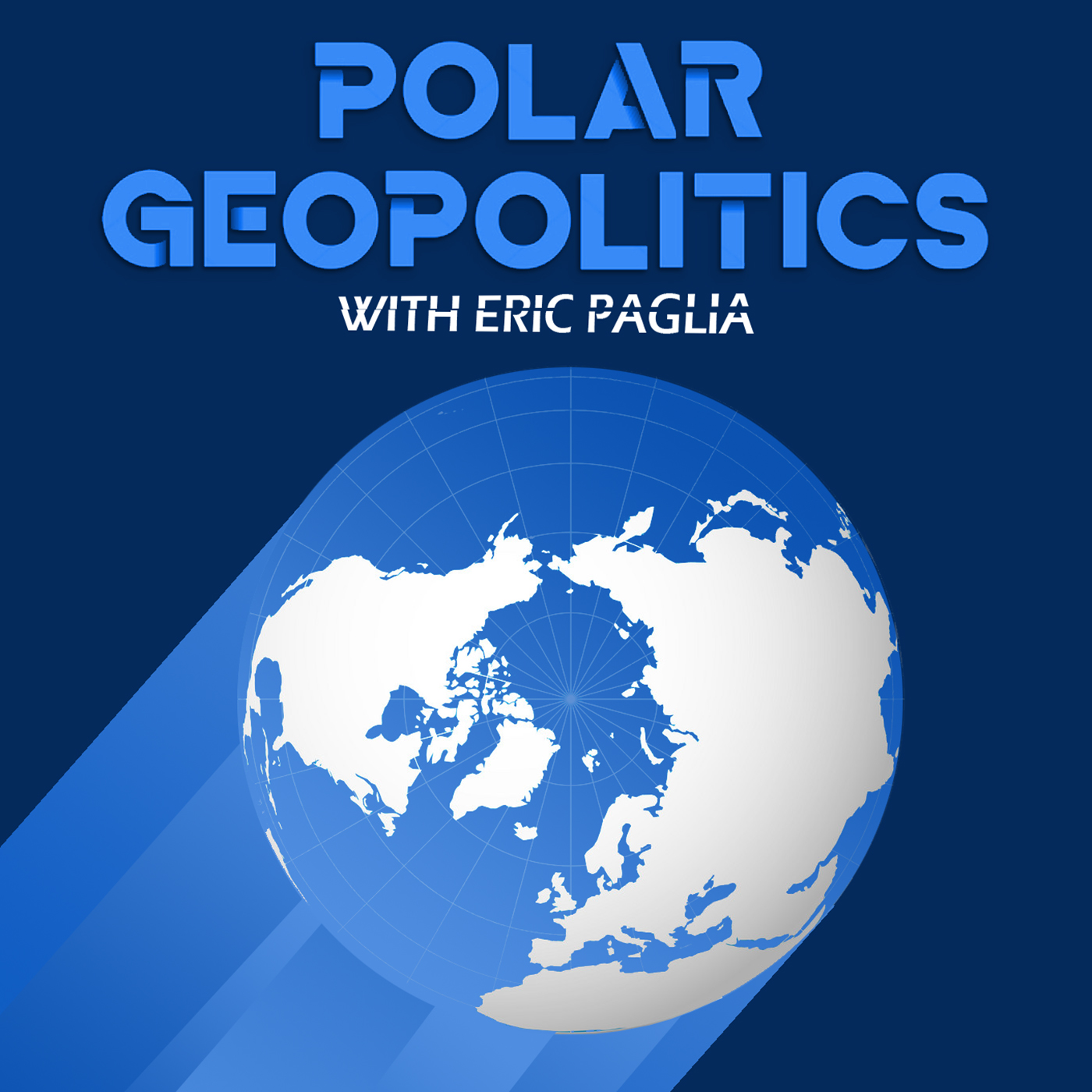Episodes

Tuesday May 20, 2025
Tuesday May 20, 2025
Two major international crises of recent years, Covid-19 and the Russian invasion of Ukraine, have had profound effects on Arctic governance. American interest in acquiring Greenland has meanwhile complicated relations between key Arctic countries. With Greenland now leading the newly-launched Kingdom of Denmark chairship of the Arctic Council at a time of great geopolitical uncertainty, this episode explores the evolution of Greenlandic foreign policy through a lens of “crisis diplomacy” with Rasmus Leander Nielsen, associate professor and head of Nasiffik - the centre for foreign and security policy at the University of Greenland.
Polar Geopolitics on Twitter / X: @polargeopol
Polar Geopolitics YouTube channel: https://www.youtube.com/@PolarGeopolitics
Polar Geopolitics on LinkedIn: https://www.linkedin.com/company/polargeopolitics
Polar Geopolitics on Facebook: https://www.facebook.com/polargeopolitics/
Polar Geopolitics website: http://www.polargeopolitics.com
Polar Geopolitics on Patreon: https://www.patreon.com/polargeopolitics
Polar Geopolitics on PayPal: https://www.paypal.com/donate/?hosted_button_id=KXUVZKGALMFXU

Friday Mar 28, 2025
Friday Mar 28, 2025
Jeppe Kofod, Denmark’s foreign minister during Trump’s first Greenland gambit, joins the podcast to analyze the current situation and share insights from his central role in resolving the previous U.S.-Denmark-Greenland crisis in 2019.
Polar Geopolitics has now started a Substack where we will provide edited episode transcripts, original articles and analyses, and other content on geopolitics, the Arctic and Antarctica: https://polargeopolitics.substack.com
Polar Geopolitics on Twitter / X: @polargeopol
Polar Geopolitics YouTube channel: https://www.youtube.com/@PolarGeopolitics
Polar Geopolitics on LinkedIn: https://www.linkedin.com/company/polargeopolitics
Polar Geopolitics on Facebook: https://www.facebook.com/polargeopolitics/
Polar Geopolitics website: http://www.polargeopolitics.com
Polar Geopolitics on Patreon: https://www.patreon.com/polargeopolitics
Polar Geopolitics on PayPal: https://www.paypal.com/donate/?hosted_button_id=KXUVZKGALMFXU

Monday Mar 17, 2025
Monday Mar 17, 2025
In this third part of the “Future of the Arctic Council” session recorded live at Arctic Frontiers, Dr. Volker Rachold and Dr. Elana Wilson Rowe discuss the continued importance, despite recent shocks to the international system, of Arctic cooperation in the context of global governance. Topics include the imperative of managing environmental problems in the Arctic and elsewhere, the Council’s strong connections to wider international processes, and how Arctic Council observer states have succeeded in embedding themselves in Arctic affairs through scientific cooperation. Volker Rachold is Head of the German Arctic Office at the Alfred Wegener Institute, and Elana Wilson Rowe is Research Professor and Head of the Center for Ocean Governance at the Norwegian Institute of International Affairs and Professor in Global Governance at the Norwegian University of the Life Sciences.
Polar Geopolitics has now started a Substack where we will provide edited episode transcripts, original articles and analyses, and other content on geopolitics, the Arctic and Antarctica: https://polargeopolitics.substack.com
Polar Geopolitics on Twitter / X: @polargeopol
Polar Geopolitics YouTube channel: https://www.youtube.com/@PolarGeopolitics
Polar Geopolitics on LinkedIn: https://www.linkedin.com/company/polargeopolitics
Polar Geopolitics on Facebook: https://www.facebook.com/polargeopolitics/
Polar Geopolitics website: http://www.polargeopolitics.com
Polar Geopolitics on Patreon: https://www.patreon.com/polargeopolitics
Polar Geopolitics on PayPal: https://www.paypal.com/donate/?hosted_button_id=KXUVZKGALMFXU

Friday Mar 07, 2025
Friday Mar 07, 2025
In May, the Kingdom of Denmark takes over from Norway chairship of an Arctic Council that continues to face an array of significant challenges in the wake of Russia’s invasion of Ukraine and other geopolitical developments. At the same time, there has also been uncertainty on whether the center of gravity of the Kingdom’s chairship will be in Copenhagen or in the Greenlandic capital of Nuuk. Here in part 2 of the “Future of the Arctic Council” session recorded live at the recent Arctic Frontiers conference, Christian Prip, senior researcher at the Fridtjof Nansen Institute, and Gosia Smieszek-Rice, postdoctoral researcher at the Arctic University of Norway, discuss the Kingdom of Denmark’s rapidly approaching chairship, the transition from Norway to Denmark, and some of the pressing issues that Nuuk and Copenhagen will face in leading the Council’s efforts to bring a degree of coherence to Arctic governance despite difficult geopolitical conditions.
Polar Geopolitics has now started a Substack where we will provide edited episode transcripts, original articles and analyses, and other content on geopolitics, the Arctic and Antarctica: https://polargeopolitics.substack.com
Polar Geopolitics on Twitter / X: @polargeopol
Polar Geopolitics YouTube channel: https://www.youtube.com/@PolarGeopolitics
Polar Geopolitics on LinkedIn: https://www.linkedin.com/company/polargeopolitics
Polar Geopolitics on Facebook: https://www.facebook.com/polargeopolitics/
Polar Geopolitics website: http://www.polargeopolitics.com
Polar Geopolitics on Patreon: https://www.patreon.com/polargeopolitics
Polar Geopolitics on PayPal: https://www.paypal.com/donate/?hosted_button_id=KXUVZKGALMFXU

Thursday Feb 27, 2025
Thursday Feb 27, 2025
Two Arctic Council insiders discuss the unique qualities and key role the Council continues to play even after Russia’s invasion of Ukraine cast it into crisis three years ago. Jennifer Spence, Director of the Arctic Initiative at Harvard’s Belfer Center, and Rolf Rødven, Executive Secretary of the Arctic Monitoring and Assessment Program, sat down with Polar Geopolitics at the Arctic Frontiers conference for a live podcast recording on the future of the Arctic Council. In the session organized by the Fridtjof Nansen Institute, Polar Geopolitics and Arctic Frontiers, Rødven and Spence argued that science diplomacy generated through Arctic Council Working Groups, as well as the participation of indigenous peoples’ groups in the Council’s work, has helped maintain a degree of exceptionalism in Arctic governance despite the fraught geopolitical situation. This is the first of three podcast episodes on the future of the Arctic Council recorded live at Arctic Frontiers in Tromsø, Norway on January 27, 2025.
Polar Geopolitics on Twitter / X: @polargeopol
Polar Geopolitics YouTube channel: https://www.youtube.com/@PolarGeopolitics
Polar Geopolitics on LinkedIn: https://www.linkedin.com/company/polargeopolitics
Polar Geopolitics on Facebook: https://www.facebook.com/polargeopolitics/
Polar Geopolitics website: http://www.polargeopolitics.com
Polar Geopolitics on Patreon: https://www.patreon.com/polargeopolitics
Polar Geopolitics on PayPal: https://www.paypal.com/donate/?hosted_button_id=KXUVZKGALMFXU

Thursday Feb 20, 2025
Thursday Feb 20, 2025
In the midst of intense international interest in Greenland, general elections have been called for March 11th, with potential geopolitical implications across a range of issues, including independence from the Kingdom of Denmark. To explain the stakes and dynamics of the upcoming election, and analyze regional security in the context of U.S. interest in acquiring Greenland, joining the podcast is Dr. Rasmus Leander Nielsen, head of the Centre for Foreign & Security Policy at the University of Greenland in Nuuk. He also analyzes relations between Copenhagen and Nuuk, as well as Greenland’s geopolitical position and natural resources, which has attracted great interest not only from the United States but also from China and the European Union. In addition, Dr. Leander Nielsen discusses the Kingdom of Denmark’s upcoming chairship of the Arctic Council, where Greenland will play a leading role.
Polar Geopolitics on Twitter / X: @polargeopol
Polar Geopolitics YouTube channel: https://www.youtube.com/@PolarGeopolitics
Polar Geopolitics on LinkedIn: https://www.linkedin.com/company/polargeopolitics
Polar Geopolitics on Facebook: https://www.facebook.com/polargeopolitics/
Polar Geopolitics website: http://www.polargeopolitics.com
Polar Geopolitics on Patreon: https://www.patreon.com/polargeopolitics
Polar Geopolitics on PayPal: https://www.paypal.com/donate/?hosted_button_id=KXUVZKGALMFXU

Sunday Jan 19, 2025
Sunday Jan 19, 2025
Independence or an American acquisition of Greenland would fracture the Kingdom of Denmark as currently constituted. On this episode, associate professor Jon Rahbek-Clemmensen, research director at the Center for Arctic Security Studies at the Royal Danish Defence College, explains how and why Copenhagen intends to keep the Kingdom intact, while also accommodating the interests of Greenlanders and avoiding alienating its closest ally, the United States, at a time of great turbulence in the European security environment.
Polar Geopolitics on Twitter / X: @polargeopol
Polar Geopolitics YouTube channel: https://www.youtube.com/@PolarGeopolitics
Polar Geopolitics on LinkedIn: https://www.linkedin.com/company/polargeopolitics
Polar Geopolitics on Facebook: https://www.facebook.com/polargeopolitics/
Polar Geopolitics website: http://www.polargeopolitics.com
Polar Geopolitics on Patreon: https://www.patreon.com/polargeopolitics
Polar Geopolitics on PayPal: https://www.paypal.com/donate/?hosted_button_id=KXUVZKGALMFXU

Wednesday Jan 15, 2025
Wednesday Jan 15, 2025
An in-depth discussion with Klaus Dodds, professor of Geopolitics at Royal Holloway University of London, on Donald Trump’s latest Greenland gambit and how the incoming US president’s geographical imagination might shape Arctic geopolitics and the liberal international order in an era of great power competition.
Polar Geopolitics on Twitter / X: @polargeopol
Polar Geopolitics YouTube channel: https://www.youtube.com/@PolarGeopolitics
Polar Geopolitics on LinkedIn: https://www.linkedin.com/company/polargeopolitics
Polar Geopolitics on Facebook: https://www.facebook.com/polargeopolitics/
Polar Geopolitics website: http://www.polargeopolitics.com
Polar Geopolitics on Patreon: https://www.patreon.com/polargeopolitics
Polar Geopolitics on PayPal: https://www.paypal.com/donate/?hosted_button_id=KXUVZKGALMFXU

